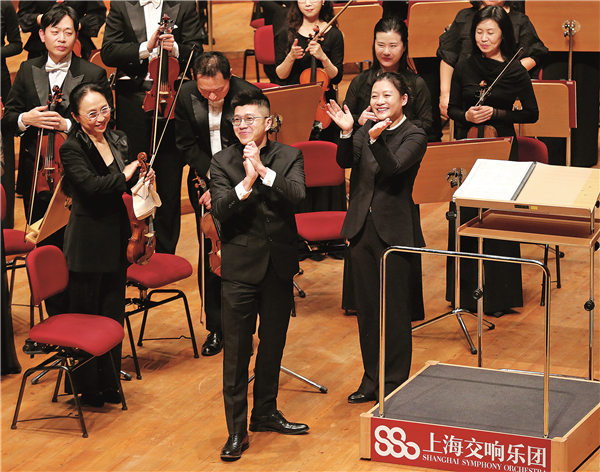

To replicate the vivid sound of prawns sizzling in oil, Leung used the ocean drum, which looks like a colorful plate with sandy grains on the bottom. It normally emits soothing waves of sounds that are often used in meditation sessions.
Along with the ocean drum, the percussion section in Chinese Kitchen also included a wok, a kitchen knife, chopsticks, bamboo tubes, and more.
Using novel and unusual instruments, such as everyday utensils to create unique sounds that traditional instruments can't make, has been a popular way to expand the possibilities of musical expression in contemporary composition. It also helped bring classical music closer to ordinary people's lives, says Zhou Ping, director of the Shanghai orchestra, who hopes to expand music appreciation and take the composition to different contexts.
"I love the humor that ripples everywhere in this work," Ma Junfeng, a Shanghai-based theater director, says after the concert. As fun a piece of composition as it is, Ma says he can't help but notice the rich emotions flowing deep in the music.
Sun Mengjin, a cultural critic, says that "aside from the colorful imagery ... we also find the deep emotions the young composer has for traditional Chinese culture".
Earlier this year at the closing concert for Music in the Summer Air festival, the orchestra premiered Wuxia, a symphonic poem by Leung in commemoration of martial arts novelist Jin Yong (Louis Cha's pen name) jointly commissioned by the Shanghai orchestra, Chengdu Symphony Orchestra in Sichuan province, and Hangzhou Philharmonic Orchestra in Zhejiang province.
As the youngest recipient of the Huabiao Film Awards for Music, 29-year-old Leung has built a prolific career composing a series of Chinese blockbuster movies, such as The Battle at Lake Changjin and Operation Red Sea, as well as Cesium Fallout, which was released nationwide in November.